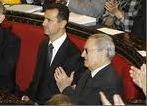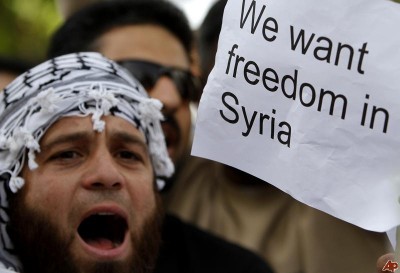 The United States imposed sanctions on Syrian President Bashar al-Assad and six other top aides for human rights abuses on Wednesday in a dramatic escalation of pressure on Syria to cease its brutal crackdown on protesters.
The United States imposed sanctions on Syrian President Bashar al-Assad and six other top aides for human rights abuses on Wednesday in a dramatic escalation of pressure on Syria to cease its brutal crackdown on protesters.
Targeting Assad personally with sanctions, which the United States and European Union have so far avoided, is a significant slap at Damascus and raises questions about whether Washington and the West may ultimately seek Assad’s removal from power.
Syrian activists say at least 700 civilians have been killed in two months of clashes between government forces and protesters seeking an end to his 11-year rule. The protests in Syria began after demonstrations toppled authoritarian leaders in Tunisia and Egypt.
The move, announced by the Treasury Department, freezes any assets of the Syrian officials that are in the United States or otherwise fall within U.S. jurisdiction and it generally bars U.S. individuals and companies from dealing with them.
In addition to Assad, the Treasury said the sanctions would target Vice President Farouq al-Shara ( pictured with Assad, Prime Minister Adel Safar, Interior Minister Mohammad Ibrahim al-Shaar, Defense Minister Ali Habib as well as Abdul Fatah Qudsiya, the head of Syrian military intelligence, and Mohammed Dib Zaitoun, director of the political security directorate.
While it was not immediately clear what practical effect the sanctions would have or whether the seven had significant assets that would be captured by the U.S. move, the symbolic gesture was profound.
“The actions the administration has taken today send an unequivocal message to President Assad, the Syrian leadership, and regime insiders that they will be held accountable for the ongoing violence and repression in Syria,” said Acting Under Secretary for Terrorism and Financial Intelligence David S. Cohen said in a written statement.
 “President al-Assad and his regime must immediately end the use of violence, answer the calls of the Syrian people for a more representative government, and embark upon the path of meaningful democratic reform,” he added.
“President al-Assad and his regime must immediately end the use of violence, answer the calls of the Syrian people for a more representative government, and embark upon the path of meaningful democratic reform,” he added.
European governments agreed on Tuesday to tighten sanctions against the Syrian leadership, but said they would decide next week about whether to include Assad on the list.
President Barack Obama last month signed an executive order imposing a first round of U.S. sanctions against Syria’s intelligence agency and two relatives of Assad’s for alleged human rights abuses.
The EU, for its part, put 13 Syrian officials on its sanctions list in what it described as a move to gradually increase pressure. Reuters

Leave a Reply
You must be logged in to post a comment.